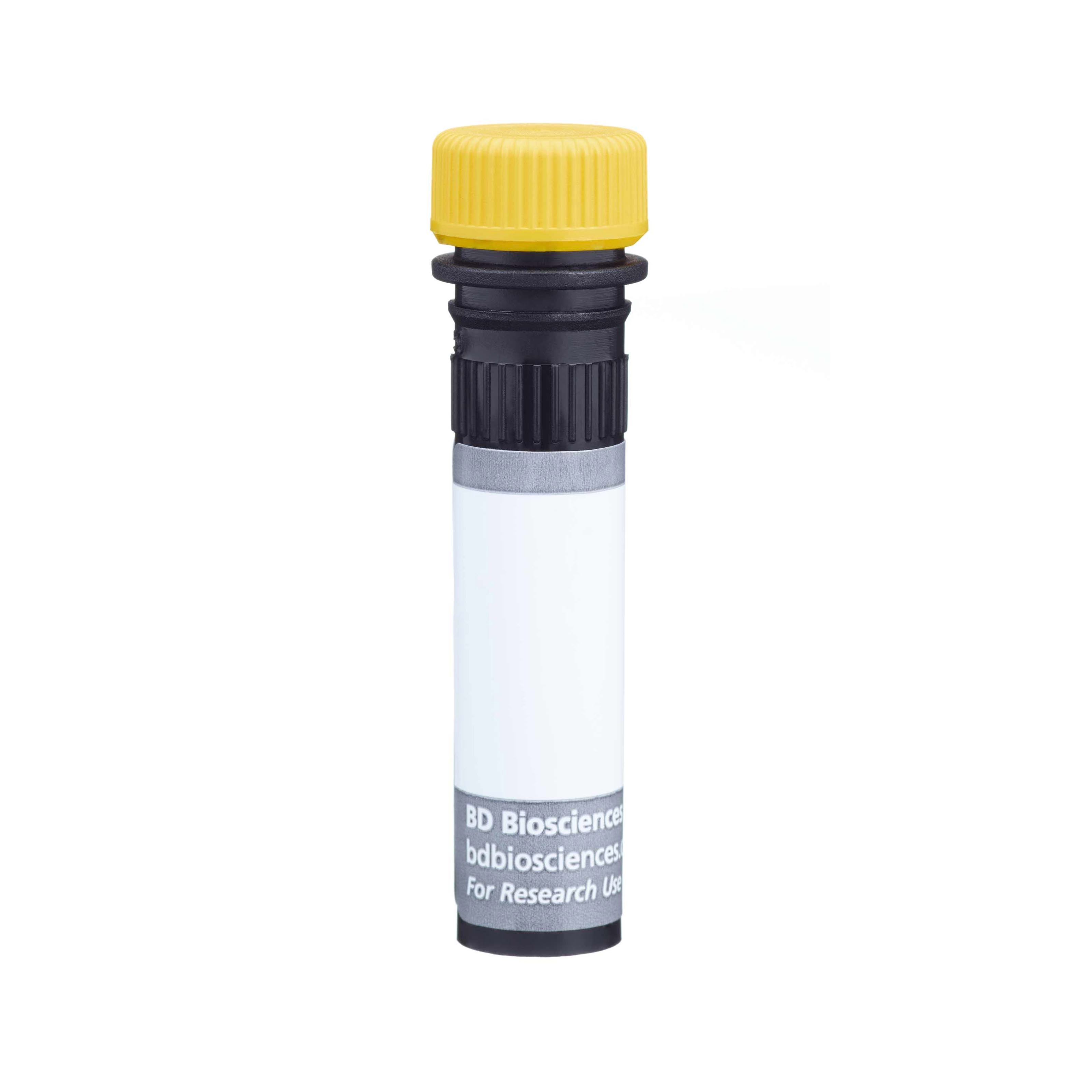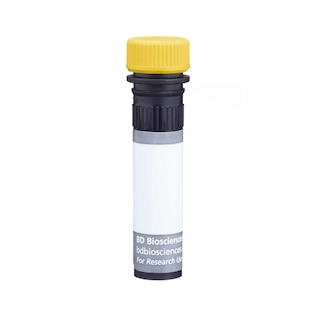Old Browser
This page has been recently translated and is available in French now.
Looks like you're visiting us from {countryName}.
Would you like to stay on the current country site or be switched to your country?


Regulatory Status Legend
Any use of products other than the permitted use without the express written authorization of Becton, Dickinson and Company is strictly prohibited.
Preparation And Storage
Recommended Assay Procedures
For optimal and reproducible results, BD Horizon Brilliant Stain Buffer should be used anytime two or more BD Horizon Brilliant dyes (including BD OptiBuild Brilliant reagents) are used in the same experiment. Fluorescent dye interactions may cause staining artifacts which may affect data interpretation. The BD Horizon Brilliant Stain Buffer was designed to minimize these interactions. More information can be found in the Technical Data Sheet of the BD Horizon Brilliant Stain Buffer (Cat. No. 563794).
Product Notices
- This antibody was developed for use in flow cytometry.
- The production process underwent stringent testing and validation to assure that it generates a high-quality conjugate with consistent performance and specific binding activity. However, verification testing has not been performed on all conjugate lots.
- Researchers should determine the optimal concentration of this reagent for their individual applications.
- An isotype control should be used at the same concentration as the antibody of interest.
- Caution: Sodium azide yields highly toxic hydrazoic acid under acidic conditions. Dilute azide compounds in running water before discarding to avoid accumulation of potentially explosive deposits in plumbing.
- For fluorochrome spectra and suitable instrument settings, please refer to our Multicolor Flow Cytometry web page at www.bdbiosciences.com/colors.
- Please refer to www.bdbiosciences.com/us/s/resources for technical protocols.
- BD Horizon Brilliant Stain Buffer is covered by one or more of the following US patents: 8,110,673; 8,158,444; 8,575,303; 8,354,239.
- BD Horizon Brilliant Ultraviolet 661 is covered by one or more of the following US patents: 8,110,673; 8,158,444; 8,227,187; 8,575,303; 8,354,239.
Companion Products






The E13-161.7 monoclonal antibody recognizes Ly-6A.2 and Ly-6E.1, which are allelic members of the Ly-6 multigene family. Ly-6A/E is also known as, stem cell antigen 1 (Sca-1/Sca1), or T-cell-activating protein (TAP). Ly-6A/E is a phosphatidylinositol-anchored protein of ~18 kDa that is expressed on multipotent hematopoietic stem cells (HSC) in mice with both Ly-6 haplotypes. Sca-1+ HSC are found in the adult bone marrow and fetal liver, but not in the early embryo yolk sac or intraembryonic hematopoietic sites, and can be mobilized to the peripheral blood and spleen in the adult. In mice expressing the Ly-6.2 haplotype (e.g., AKR, C57BL, C57BR, C57L, C58, DBA/2, PL, SJL, SWR, 129), Ly-6A/E is also expressed on distinct subpopulations of bone marrow and peripheral B lymphocytes, myeloid cells, and thymic and peripheral T lymphocytes, on the earliest intrathymic T-cell precursor population, and in several non-hematopoietic tissues. Strains with the Ly-6.1 haplotype (e.g., A, BALB/c, CBA, C3H/He, DBA/1, NZB) have few Ly-6A/E+ resting peripheral lymphocytes, whereas activation of T cells from mice of both Ly-6 haplotypes leads to strong expression of the Sca-1 antigen. Studies with the D7 antibody have demonstrated that Ly-6A/E may be involved in the regulation of B and T lymphocyte responses, and it appears to be required for T-cell receptor-mediated T-cell activation. Purified E13-161.7 mAb can block binding of FITC-conjugated D7 antibody (anti-Ly-6A/E) to mouse splenocytes, but purified mAb D7 is unable to block binding of FITC-conjugated E13-161.7 antibody. Anti-Ly-6A/E (Sca-1) mAb may be used in combination with a Mouse Lineage Antibody Panel (e.g., Cat. No. 559971) to identify HSC.
The antibody was conjugated to BD Horizon™ BUV661 which is part of the BD Horizon Brilliant™ Ultraviolet family of dyes. This dye is a tandem fluorochrome of BD Horizon BUV395 with an Ex Max of 348-nm and an acceptor dye with an Em Max at 661-nm. BD Horizon Brilliant BUV661 can be excited by the ultraviolet laser (355 nm) and detected with a 670/25 filter and a 630 nm LP. Due to cross laser excitation of this dye, there may be significant spillover into channels detecting APC-like emissions (eg, 670/25-nm filter).
Due to spectral differences between labeled cells and beads, using BD™ CompBeads can result in incorrect spillover values when used with BD Horizon BUV661 reagents. Therefore, the use of BD CompBeads or BD CompBeads Plus to determine spillover values for these reagents is not recommended. Different BUV661 reagents (eg, CD4 vs. CD45) can have slightly different fluorescence spillover therefore, it may also be necessary to use clone-specific compensation controls when using these reagents.
Development References (4)
-
Aihara Y, Buhring HJ, Aihara M, Klein J. An attempt to produce "pre-T" cell hybridomas and to identify their antigens. Eur J Immunol. 1986; 16(11):1391-1399. (Immunogen: Cytotoxicity, Flow cytometry). View Reference
-
Kawamoto H, Ohmura K, Katsura Y. Direct evidence for the commitment of hematopoietic stem cells to T, B and myeloid lineages in murine fetal liver. Int Immunol. 1997; 9(7):1011-1019. (Clone-specific: Flow cytometry, Fluorescence activated cell sorting). View Reference
-
Marcos MA, Morales-Alcelay S, Godin IE, Dieterlen-Lievre F, Copin SG, Gaspar ML. Antigenic phenotype and gene expression pattern of lymphohemopoietic progenitors during early mouse ontogeny. J Immunol. 1997; 158(6):2627-2637. (Biology). View Reference
-
Osawa M, Nakamura K, Nishi N, et al. In vivo self-renewal of c-Kit+ Sca-1+ Lin(low/-) hemopoietic stem cells. J Immunol. 1996; 156(9):3207-3214. (Clone-specific: Flow cytometry, Fluorescence activated cell sorting). View Reference
Please refer to Support Documents for Quality Certificates
Global - Refer to manufacturer's instructions for use and related User Manuals and Technical data sheets before using this products as described
Comparisons, where applicable, are made against older BD Technology, manual methods or are general performance claims. Comparisons are not made against non-BD technologies, unless otherwise noted.
For Research Use Only. Not for use in diagnostic or therapeutic procedures.
Report a Site Issue
This form is intended to help us improve our website experience. For other support, please visit our Contact Us page.